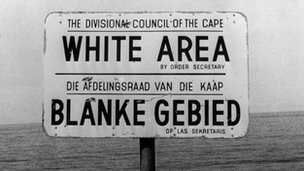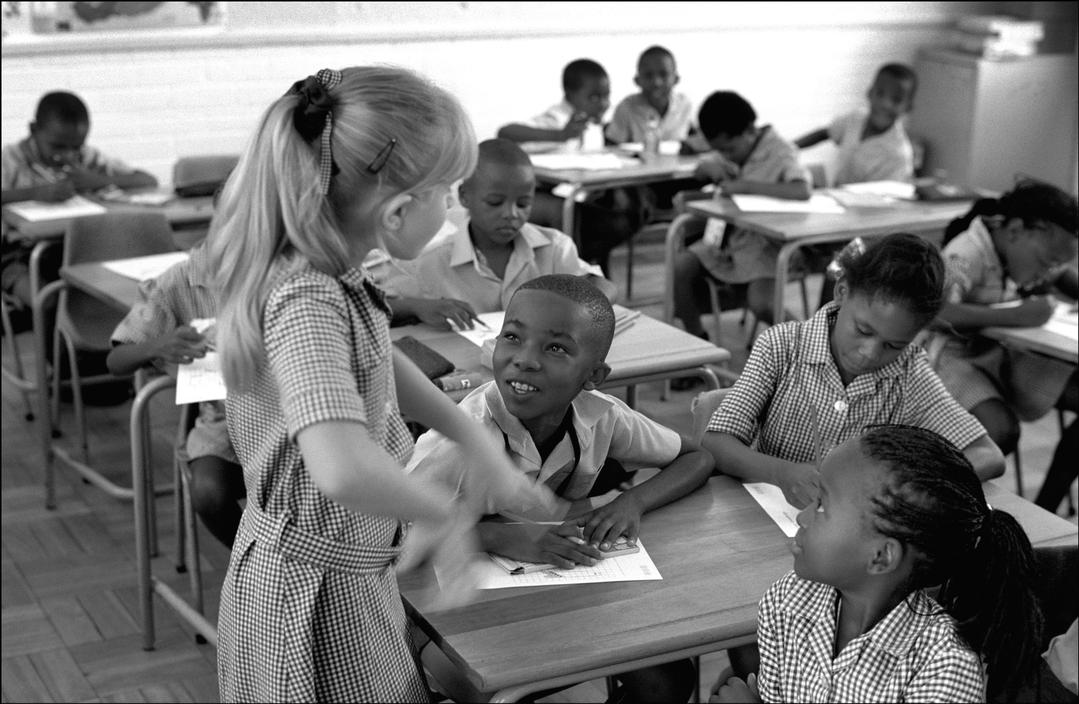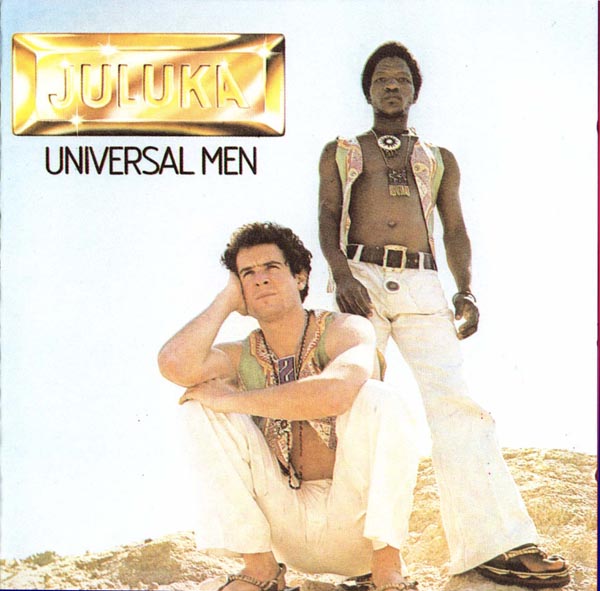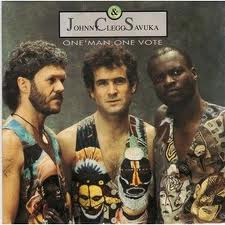Johnny Clegg
He has been a singer since 1980 and plays guitar and sings.
His nickname is the White Zulu because he plays black influenced music whereas he is white.
Six months after his birth, his parents divorced, and after a brief visit to Israel, the mother returned to raise her child alone on the family farm in Gwelo near Selukwe, Rhodesia (now Zimbabwe). White child in South Africa under the Apartheid, Jonathan grew up in an isolated environment within the African culture.
When he was six, his mother, who was a singer in night clubs, toured the country and sent him to an English pension reserved for whites with a strict discipline from which he keeps a very bad memory.
A year later, his mother married a South African journalist, Dan Pienaar, and the family settled for two years in an apartment in the center of Johannesburg. Writer and poet from a very poor white working class, his stepfather had a strong influence in the education of Jonathan (who knew his biological father only at age of 21) and he shared his passion for Africa.
The family then went to live for two years in Zambia, where the step-father of Jonathan had found a place in a newspaper in Lusaka and went to cover the war in Congo. During this time, the new independence of Africa helped Jonathan Clegg to enter for the first time in a multiracial school. He returned to Johannesburg. His stepfather taught him to survive in the wilderness by taking him all weekend camping in the bush. While the boy began his teens, his stepfather fled overnight to Australia with another woman, taking the half-sister of Jonathan, who had just turned three years old.
Thirteen
years old, feeling completely foreign to religion and to the Jewish
community that he thought too passive in the face of the Apartheid,
he refused to do his bar mitzvah. At fourteen, he couldn't bear
school either and he ran away for three weeks in Zulu territory with
two friends before being found by the police. Back in Johannesburg,
he began hanging out in the streets without enthusiasm.
Jonathan, everyone started calling Johnny, was introduced to the guitar at fifteen, allowing him to meet a musician who played Zulu music in a street near his home, Mntonganazo Mzila. Despite the language barrier, Clegg learnt the basics of Zulu music and Ihhlangwini accompanying Mzila in all "hostels" accommodation centers for migrant workers during two years, violating the ban on blacks and whites to cross the boundary of reserved sectors. This allowed Clegg to get a reputation as a good musician and really understand the gap of the Apartheid.
At
the same time, Sipho Mchunu
had left his native Zulu land to work as a gardener in Durban. Having
earned a reputation as a good guitarist, and attracted by the
prospect of a higher salary, he decided to go to the big city, where
he heard for the first time of a young white talented Zulu musician .
It turned out that the district was also the one where Johnny and Sipho worked. This led to the inevitable meeting between the two musicians. First driven by their desire to compare their guitar skills, the two friends joined together to form an extraordinary duo, which would be an international success.
In
1976, Johnny and Sipho found their first real contract, under the
name Johnny and Sipho
and followed the release of their first album Woza
Friday (Come Friday) that amazed the whole
country. This is where the concept started: Johnny Clegg mixing
English lyrics and Western melodies with Zulu music. In 1979, the duo
changed its name to become Juluka
whose debut album, despite positive critical acclaim, was censored in
South Africa, still under the thumb of the Apartheid. Their second
album, African Litany,
was their first major national success, including their first hit
Impi. Finally,
the fourth album marked their breakthrough on the world stage. The
fifth album of Juluka
became gold record and won two platinum records later on.
In 1985, the adventure ended with Juluka because Sipho returned to provide assistance to the community. Johnny formed his second band Savuka. Johnny Clegg and Sipho Mchunu never lost contact and decided later to repeat a tour and a new album together.
In 1985, the adventure ended with Juluka because Sipho returned to provide assistance to the community. Johnny formed his second band Savuka. Johnny Clegg and Sipho Mchunu never lost contact and decided later to repeat a tour and a new album together.
The
first album of Savuka,
Third
World Child ,
(a title that announced engagement) was a huge success, with more
than two million copies sold worldwide and titles flagship like
Asimbonanga
(song
dedicated to Nelson Mandela, then a prisoner on Robben Island off
Cape Town)
and Scatterling
of Africa, which
was taken for the soundtrack of the film Rain
Man,
which attested to its international success at that time.
The next
Shadow
Man
allowed Clegg to undertake a world tour, sharing the stage with Steve
Winwood among others the United States and George
Michael in
Canada. In 1988, he was the biggest seller of singles in France. The
fourth album Heat,
Dust and Dreams
was nominated in the Best World Music category and won the Billboard
Muscic Award for best album in the world in 1993.
During all these
years, Johnny Clegg never stopped touring in South Africa. In 1994,
he promoted his compilation album of the best titles In
My African Dream.
In 1997, Johnny and Sipho met to work on a new Juluka
album,
after a break of ten years. This collaboration produces the album Ya
Vuka Inkunzi
(The Bull Has Risen, Crocodile Love).
Released
in 2006, One
Life
was produced by Chad Blake. Among them was a song about child
soldiers (Boy
Soldier).
With this album, we also discovered a new Johnny Clegg with a song in
French Should
not give up.
In December 2009, the song The Crossing (Osiyeza) was part of the soundtrack of the film Invictus directed by Clint Eastwood, which traced the journey of the South African team to the Rugby XV World Championship in Africa in 1995.
2010 saw the release of Spirit is the Journey, subtitled "Celebrating 30 years of Johnny Clegg," a compilation made by the artist himself, who presented a selection of 17 titles period Savuka and 17 titles from the period Juluka and some lesser known titles of solo albums (New World Survivor, One Life), a large sample of his production during his thirty-year career.
2010 was also the year of the release of the album Human, produced by Nicolas Fiszman, and a European and North American tour took him to over 35 cities in the United States and Canada .
His song Ibhola Lethu dealing with segregation in the stadiums during the Apartheid period where teams of Soweto dominated but where blacks were banned from stage alongside whites, was chosen as an anthem for the World Cup 2010 .
Gaetan
and Nathan












Aucun commentaire:
Enregistrer un commentaire